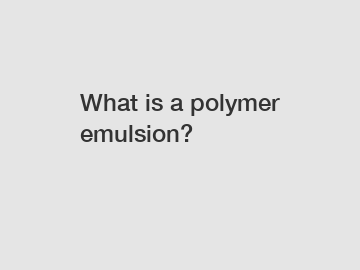What is a polymer emulsion?
What is a Polymer Emulsion?
Polymer emulsion, have you ever wondered what it is and how it is made? In this article, we will delve into the world of polymer emulsions, exploring their composition, production process, and applications. So, let's get started!
1. Defining Polymer Emulsion:

A polymer emulsion is a colloidal dispersion of polymer particles in water. In simple terms, it is a mixture of water and a polymer, where the polymer particles are finely dispersed or suspended throughout the water. This unique combination gives polymer emulsions their distinctive properties and applications.
2. Composition of Polymer Emulsion:
Polymer emulsions consist of two primary components: the polymer and water. The polymer can be either synthetic or natural, depending on the desired properties and applications of the final product. Common synthetic polymers used in emulsions include acrylics, styrene-butadiene rubber (SBR), and polyvinyl acetate (PVA), while natural polymers such as proteins and cellulose derivatives are also utilized.
3. Production Process of Polymer Emulsion:
The production of polymer emulsions typically involves three main steps: polymerization, emulsification, and stabilization. During polymerization, monomers (building blocks of polymers) are chemically bonded to form large polymer chains. Emulsification then occurs by introducing the polymer into water, while simultaneously applying mechanical energy like stirring or high-pressure homogenization. This process breaks down the polymer into small particles, forming the emulsion. Lastly, stabilization agents, called emulsifiers or surfactants, are added to prevent the polymer particles from coalescing or agglomerating, ensuring long-term stability.
4. Applications of Polymer Emulsion:
Polymer emulsions find extensive applications across various industries due to their versatile nature. Some key areas where they are commonly utilized include:
4.1. Adhesives and Sealants:
Polymer emulsions are widely used in the formulation of adhesives and sealants. The adhesive properties of polymer emulsions, coupled with their ability to provide excellent bonding strength and durability, make them an ideal choice for applications such as woodworking, paperboard lamination, and construction.
4.2. Coatings and Paints:
In the coatings and paints industry, polymer emulsions are utilized for their ability to create durable and high-performance coatings. Emulsion paints, for example, consist of pigment particles dispersed in a polymer emulsion binder. The emulsion allows for easy application, while the polymer provides excellent adhesion, flexibility, and chemical resistance.
4.3. Textiles and Nonwovens:
Polymer emulsions play a significant role in the textile and nonwovens industry, particularly for imparting functionality and enhancing performance. They are used as sizing agents to provide strength and flexibility to yarns during weaving or knitting processes. Additionally, polymer emulsions can improve the properties of nonwoven fabrics, such as absorbency, softness, and strength.
4.4. Paper and Packaging:
In the paper and packaging industry, polymer emulsions are applied to enhance paper properties like strength, printability, and water resistance. They act as binding agents during the papermaking process, improving the pulp's overall strength and reducing fiber loss. Moreover, polymer emulsions are used as a coating on paper or cardboard surfaces to provide barrier properties and enhance the final product's visual appearance.
5. Conclusion:
In conclusion, a polymer emulsion is a colloidal dispersion of polymer particles in water. Composed of water and polymer, they are produced through a series of steps, including polymerization, emulsification, and stabilization. Polymer emulsions find extensive applications in numerous industries, including adhesives and sealants, coatings and paints, textiles and nonwovens, as well as paper and packaging. Their versatility and ability to improve various product attributes have made them an integral part of modern manufacturing processes. So, next time you come across a coating, adhesive, or even a sheet of paper, you might just be encountering the wonders of polymer emulsions.
The company is the world’s best water based polymer emulsion, styrene acrylic emulsion for wall coating, acrylic emulsion supplier. We are your one-stop shop for all needs. Our staff are highly-specialized and will help you find the product you need.


